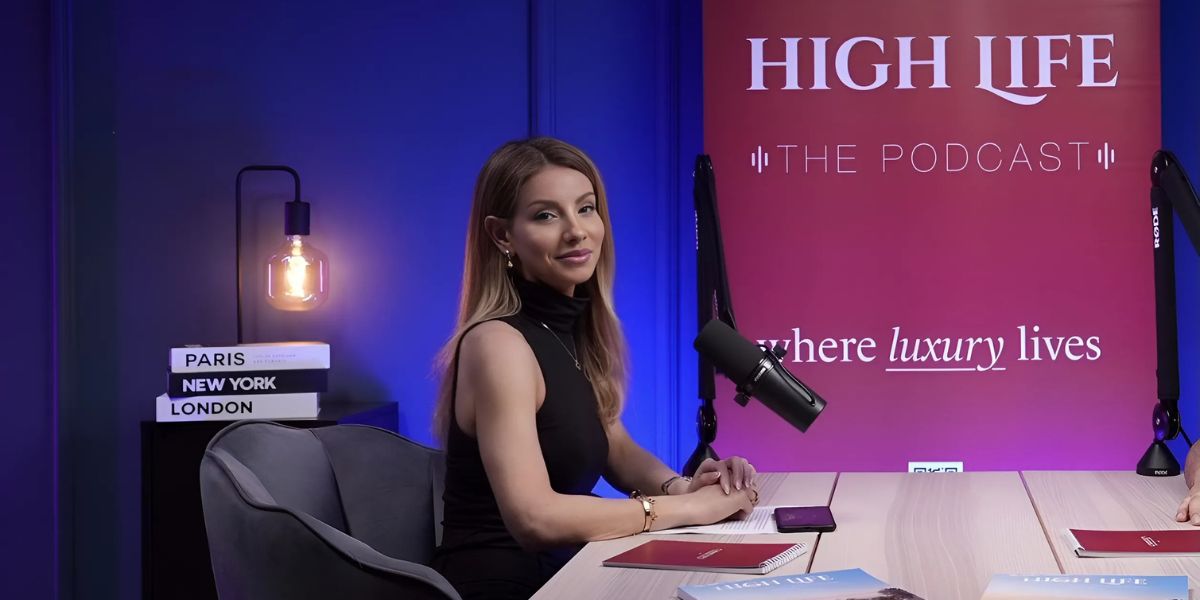By: Jasmine Waltz
In today’s world of luxury marketing, success no longer hinges on the product alone. What matters is the narrative behind it – how it fits into someone’s aspirations, future, and sense of belonging. It’s about crafting a message that evokes emotional resonance – communicating experiences people want to live, communities they wish to belong to, and financial futures they want to achieve. And no one exemplifies this better than Nikolett Vilmos, Head of Marketing at Christie’s International Real Estate Dubai.
With a background in luxury hospitality, performance marketing, and financial storytelling, Vilmos is taking a unique approach—one that shifts the focus from property specs or product features to emotional resonance, economic strategy, and social identity. Her approach doesn’t just make people want to buy, it makes them connect with the product.
From Product-First to People-First
“Today’s luxury buyer doesn’t just want to acquire an aesthetic object or home,” Vilmos explains. “They want to buy into a narrative, an experience, a financial strategy, a community.”
That perspective drives every campaign she leads. At Christie’s International Real Estate Dubai, her job isn’t just to market homes worth $50M and above or branded residences inspired by global icons – it’s to craft narratives that make each offering feel emotionally aspirational, financially rewarding, and socially magnetic.
Emotion and Motivation: The Ultimate Conversion Strategy
Vilmos’s philosophy is grounded in behavioral science: emotion drives action. She believes emotional engagement is not optional but essential, especially in high-value purchases.
“You can present all the specs and data in the world, but if you don’t make someone feel something, they won’t act,” she says.
Her messaging framework is built around three core human motivators: reward, ideology, and ego. “If the prospect has a strong ideology of family, the property should be presented as the perfect environment for raising happy children.” She explains. “If the aim is to activate the prospect’s reward motivator, the home can be framed as a wealth-preserving or appreciating asset. And to build on an ego trigger, I paint the picture of entertaining guests in a world-class setting or belonging to an esteemed community.” For Vilmos, every message is tailored to resonate with what the buyer feels, not just what they want to hear.
Hospitality: The Foundation of Experiential Thinking
Vilmos’s work is deeply informed by her early career in luxury hospitality, a world where room rates or wine lists don’t measure success, but by the experiences people take home with them.
“In hospitality, you’re never just selling a dinner or a suite – you’re selling a feeling, a memory, an experience,” she says. “That mindset has never left me.”
This insight forms the core of her experiential marketing philosophy, which is supported by research.
“Research shows that experiential purchases bring more happiness to consumers than materialistic ones,” she recounts, “and according to some studies, people reported feeling more kinship with someone who had made the same experiential purchase than someone who had made the same material purchase.”
Vilmos applies this by positioning properties as experiences: she evokes the vision of sunset dinners on the terrace, the sense of calm that comes with stepping into the lobby, or the feeling of belonging to a like-minded community. She believes that making a product feel experiential drives a stronger desire to purchase, a higher sense of belonging, and greater satisfaction.
Building Communities, Not Just Client Lists
Guided by the understanding that community and social connection are powerful drivers behind high-value purchases, in 2024, Vilmos launched the Women with Vision initiative, a Michelin-star brunch and panel designed to foster an empowering community for women to explore real estate as a vehicle for investment. The event attracted a robust roster of female voices, from philanthropists to editors-in-chief, and sparked conversations far beyond the event itself.
But this wasn’t just about selling property. The goal was to create a space where women felt seen and supported. A community they aspired to belong to. The results were tangible: new buyer demographics, record-breaking social engagement, and industry-wide impact. A year later, the Dubai Land Department followed suit with its own “She Pioneers” initiative.
“People want to be part of something bigger,” Vilmos says. “That’s what community branding taps into – an emotional and social identity that outlives the campaign.”
Financial Literacy as Emotional Marketing
Beyond community building, the event also aimed to provide financial education to a historically underserved demographic.
This is where her bachelor’s degree in finance and her background in fintech marketing become invaluable. Having built campaigns for some of the most complex and regulated sectors, she learned how to translate dense financial concepts into clear, compelling narratives – and more importantly, how to weave those narratives into messages that make people feel educated, astute, and confident.
Vilmos is also acutely aware that financial narratives are some of the strongest drivers of action. She believes every high-value purchase, whether it’s a penthouse or a private membership, should be positioned not as an indulgence but as part of a bigger investment strategy.
But with this strategy comes responsibility. Her campaigns are built on ethics and transparency, framing financial benefits accurately while avoiding exaggerated promises or pressure.
For Vilmos, education isn’t a sales tactic. It’s an emotional catalyst, transforming uncertainty into empowerment and aspiration into tangible action, while ensuring the message remains truthful, respectful, and grounded in integrity.
The Narrative Is the Product
Vilmos treats every touchpoint as part of a larger narrative of identity. The podcast High Life, which she hosts and produces, isn’t just a brand extension; it’s a platform that extends the conversation, contextualises trends, educates viewers, and humanizes luxury. It brings together leaders from a broader range of industries, including real estate, aviation, hospitality, and private finance. With over a million impressions and high-profile guests, it has become a platform that reinforces her belief that every message contributes to a bigger story.
The New Language of Luxury
Nikolett Vilmos represents a new class of brand marketers – those who understand that in today’s luxury landscape, ownership is no longer the ultimate goal. Buyers seek meaning, identity, and connection. They want to see their values reflected in the brands they choose and feel emotionally affirmed by their investments.
Ultimately, the strongest brands don’t just sell. They create belief.
Disclaimer: This article is for informational purposes only and does not constitute financial, investment, or legal advice. Any references to financial strategies or investment opportunities are illustrative and should not be interpreted as guarantees of future results. Readers are encouraged to seek independent professional advice before making any investment or purchasing decisions. The views expressed belong solely to the individuals mentioned and do not represent official positions of Christie’s International Real Estate Dubai or its affiliates.









